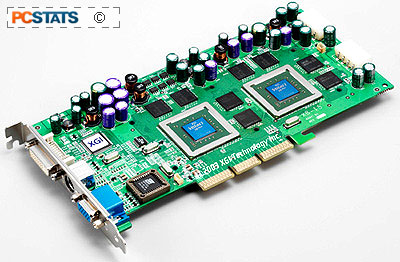Every company these days seems
to be putting out a unified driver for at least their newer lines
of products, and why not? While a few years ago
it might not have seemed so obvious to whack all your
drivers together into one huge package, in the current era of practically universal
broadband coverage, what's a few Megabytes extra compared with simplifying things for your customers?
XGI technology is sensibly going
along with the trend and presenting the 'Reactor' unified driver for all Volari
GPUs (except the XP5 mobile GPU, as it is derived from a separate technology.)
Conclusions and observations
 There's a lot of promise in
the Volari line. While some may find the idea of a new
company instantly competing with the big boys of the graphics biz hard to
take, the fact is that the company is composed of people
who have been making graphics technology for a long time.
There's a lot of promise in
the Volari line. While some may find the idea of a new
company instantly competing with the big boys of the graphics biz hard to
take, the fact is that the company is composed of people
who have been making graphics technology for a long time.
On the other hand, their pedigree
as far as graphics for gamers are concerned is dubious. Neither SiS (despite
the Xabre) or Trident were noted for having much (or any)
impact on the games/enthusiast graphics market prior to this point.
Still,
perhaps the formation of XGI signifies a renewed focus on conquering this
difficult market. XGI recently released some 3Dmark 2003 benchmarks obtained on
a 3Ghz Pentium 4 system with 512MB of DDR memory:
Volari Duo V8 ultra - 5500-5600 3D Marks
Volari Duo V5 Ultra - 4000+ 3D Marks
Volari V8 Series - 3000+ 3D Marks
Volari V5 Series - 2000+ 3D Marks
Volari V3 Series - 1000+ 3D Marks
Benchmarks shown at the 2003
Computex in Taiwan upheld these numbers, for the top of the line Duo cards
anyhow, so things look very promising on this front.
XGI is
claiming that their Dual-GPU model for the Duo range of cards
will be the wave of the future, citing the increasing complexity of single GPU
designs, with the attending increased costs and reduced yields.
If the Duo V8 Ultra makes a big enough splash, expect
to see other manufacturers, especially Nvidia whose progress has fallen behind
the curve of late, sit up and take notice. Volari-based products should begin to
come onto market in late November of this year.
Find out about this and many other reviews by joining
the Weekly PCstats.com Newsletter today!
